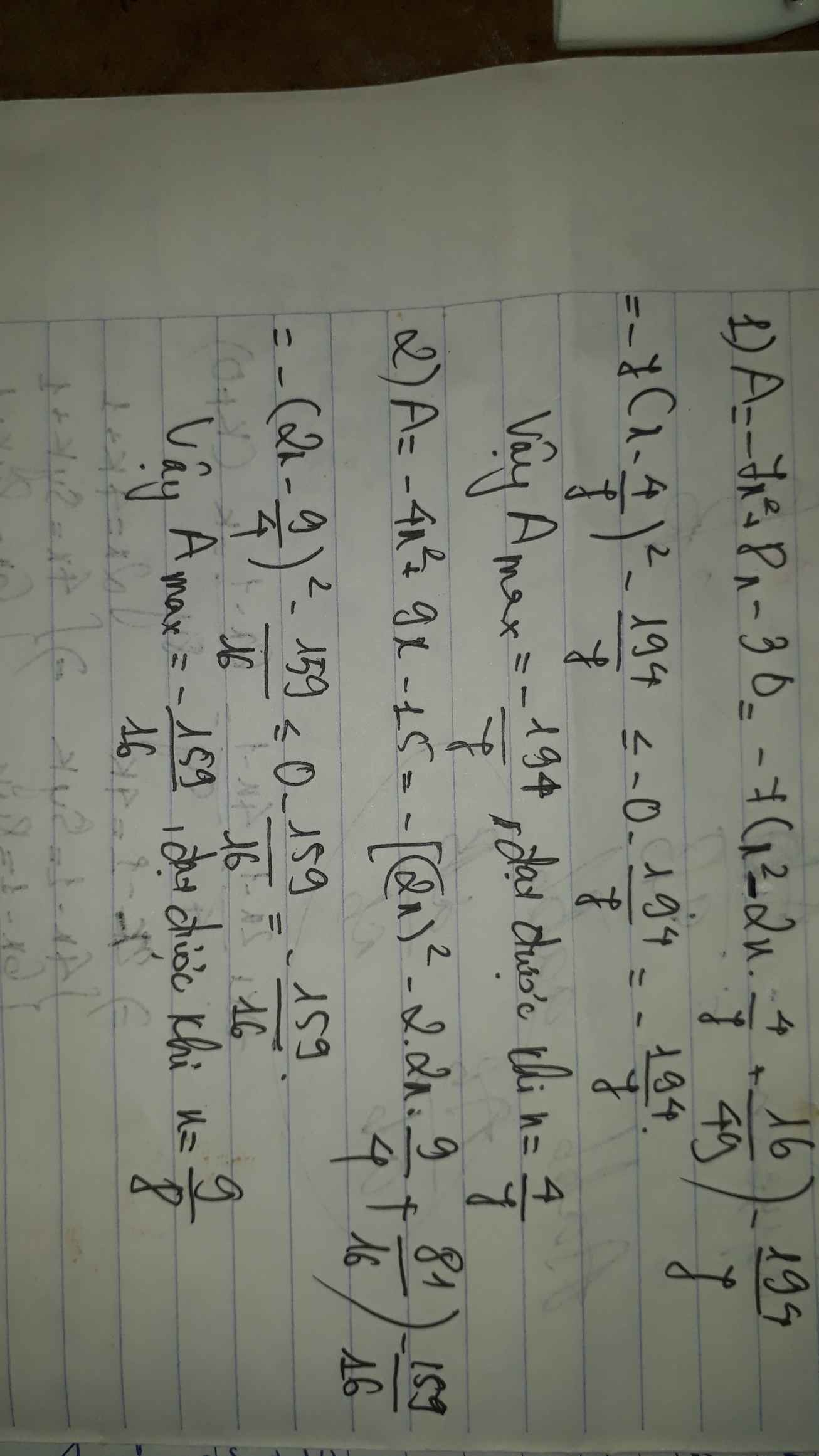1/1x4+1/4x2+1/2x8+1/8x4+1/4x16+1/16x8
giúp mik với ak mik cần gấp
Hãy nhập câu hỏi của bạn vào đây, nếu là tài khoản VIP, bạn sẽ được ưu tiên trả lời.


\(\frac{1}{21}+\frac{1}{31}+\frac{1}{43}+...+\frac{1}{211}< \frac{1}{20}+\frac{1}{30}+\frac{1}{42}+...+\frac{1}{210}=A\)
Mà \(A=\frac{1}{4.5}+\frac{1}{5.6}+\frac{1}{6.7}+...+\frac{1}{14.15}\)
\(A=\frac{5-4}{4.5}+\frac{6-5}{5.6}+\frac{7-6}{6.7}+...+\frac{15-14}{14.15}\)
\(A=\frac{1}{4}-\frac{1}{5}+\frac{1}{5}-\frac{1}{6}+\frac{1}{6}-\frac{1}{7}+...+\frac{1}{14}-\frac{1}{15}=\frac{1}{4}-\frac{1}{15}=\frac{3}{20}\)
Mà \(\frac{1}{5}=\frac{4}{20}>A=\frac{3}{20}\)
=> Biểu thức đề bài cho là đúng

Lời giải:
$x,y$ tự nhiên
$(2x+1)(y^2-5)=12$.
$\Rightarrow 2x+1$ là ước của $12$
$x\in\mathbb{N}$ kéo theo $2x+1$ là số tự nhiên lẻ nên $2x+1$ là ước tự nhiên lẻ của $12$
$\Rightarrow 2x+1\in\left\{1; 3\right\}$
Nếu $2x+1=1$:
$y^2-5=\frac{12}{1}=12\Rightarrow y^2=17$ (không thỏa mãn do $y$ tự nhiên)
Nếu $2x+1=3$
$\Rightarrow x=1$
$y^2-5=\frac{12}{2x+1}=4\Rightarrow y^2=9=3^2=(-3)^2$
Do $y$ tự nhiên nên $y=3$
Vậy $(x,y)=(1,3)$

ta có: \(S=1+1\times2+2\times3+3\times4+...+38\times39+39\times40+40\)
\(\Rightarrow3S=1\times3+1\times2\times3+2\times3\times3+...+39\times40\times3+40\times3\)
\(3S=3+1\times2\times\left(3-0\right)+2\times3\times\left(4-1\right)+...+39\times40\times\left(41-38\right)+120\)
\(3S=3+1\times2\times3+2\times3\times4-1\times2\times3+...+39\times40\times41-38\times39\times40+120\)
\(3S=\left(3+1.2.3+...+39.40.41+120\right)-\left(1.2.3+...+38.38.40\right)\)
\(3S=3+39.40.41+120\)
\(\Rightarrow S=\left(3+39.40.41+120\right):3\)
\(S=21361\)

\(x\left(x-\frac{1}{3}\right)< 0\)
Để \(x\left(x-\frac{1}{3}\right)< 0\)thì x và \(x-\frac{1}{3}\)trái dấu nhau
Thấy \(x>x-\frac{1}{3}\)\(\Rightarrow\hept{\begin{cases}x>0\\x-\frac{1}{3}< 0\end{cases}\Rightarrow\hept{\begin{cases}x>0\\x< \frac{1}{3}\end{cases}\Leftrightarrow}0< x< \frac{1}{3}}\)

\(a,\Leftrightarrow\left(5x+1\right)\left(x-4\right)-\left(x-4\right)=0\\ \Leftrightarrow\left(x-4\right)\left(5x+1-x\right)=0\\ \Leftrightarrow5x\left(x-4\right)=0\\ \Leftrightarrow\left[{}\begin{matrix}x=0\\x=4\end{matrix}\right.\\ b,\Leftrightarrow2x^2-10x-2x^2-3x=26\\ \Leftrightarrow-13x=26\\ \Leftrightarrow x=-2\\ c,\Leftrightarrow x^3+1-x^3+3x=15\\ \Leftrightarrow3x=14\\ \Leftrightarrow x=\dfrac{14}{3}\)
\(d,\Leftrightarrow x^3-5x+2x^2-10+5x-2x^2-17=0\\ \Leftrightarrow x^3-27=0\\ \Leftrightarrow x^3=27\\ \Leftrightarrow x=3\)

ai giúp mik với ak mik cần gấp
\(\dfrac{1}{1.4}+\dfrac{1}{4.2}+\dfrac{1}{2.8}+\dfrac{1}{8.4}+\dfrac{1}{4.16}+\dfrac{1}{16.8}\)
= \(\dfrac{1}{4}.\left(1+\dfrac{1}{2}+\dfrac{1}{4}+\dfrac{1}{8}+\dfrac{1}{16}+\dfrac{1}{32}\right)\)
= \(\dfrac{1}{4}.\left(\dfrac{3}{2}+\dfrac{3}{8}+\dfrac{3}{32}\right)\)
= \(\dfrac{1}{4}.\dfrac{3}{2}\left(1+\dfrac{1}{4}+\dfrac{1}{16}\right)\)
= \(\dfrac{1}{4}.\dfrac{3}{2}\left(\dfrac{16}{16}+\dfrac{4}{16}+\dfrac{1}{16}\right)\)
= \(\dfrac{3}{8}.\dfrac{21}{16}\)
= \(\dfrac{63}{128}\)